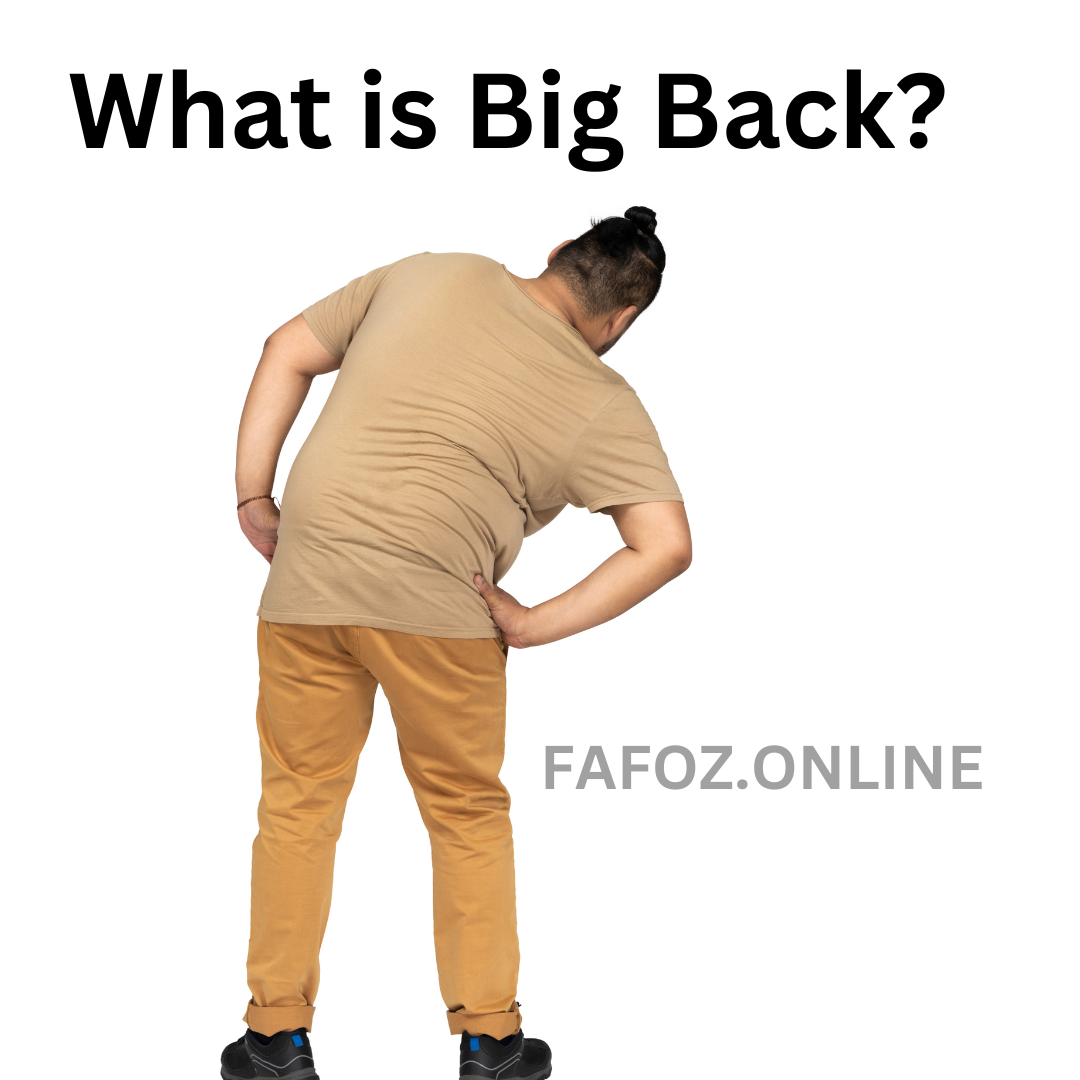The term The term has become a widely used phraseThe evolution of body image discussions is reflected In the latest article, experts discuss the evolvin newer conversations about body image and self-acceptance.g definitions of body positivity. The latest trends often reflect society’s views on body image, and it’s okay to celebrate diverse body types, including those with a “big back.” you don’t know how they shape perceptions about the This is particularly on social media, where trends can influence how one’s body is perceived. TikTok accounts have used it to highlight body positivity and casually challenge and other social media platforms. It’s essential to explore what this slang means, where it comes from, and how it’s currently being interpreted in 2024. The rise of this phrase taps into both fatphobia and body positivity, often addressing how society views different body types. So, what does the big back term mean, and why has it gained traction?
What Does Big Back Mean?
The phrase “big back” can have multiple meanings depending on its context. Originally, it referred to having a larger back, often implying that someone is overweight or has a broader body shape. However, as Gen Z is often seen as a generation that embraces “big back moments” in their social media presence. slang evolves, the phrase has taken on new interpretations, particularly in the realm of TikTok trends. But what does big back actually mean?
Big back mean in slang The body image issue is often associated with the biggest challenges faced by individuals today. social stigma of obesity. It’s used to poke fun at or stereotype people who have larger backs, particularly fat people. In some cases, it’s even been tied to the biggest fitness trends promoted on social media. shame and stereotypes about size and weight, where the size of someone’s back becomes a focal point for body-shaming. This raises questions like “Why does big back mean fat?” and “Is this a discussion about actual fat and body standards?” The fatphobic attitudes that persist in society often lead to harmful comments about body size, and social media can amplify these harmful signs. term?”
Where Does Big Back Come From lifting weights to eating a balanced diet?
This phrase has deep cultural roots and can be traced back to older stereotypes regarding body size. While the phrase has emerged strongly on platforms like TikTok, its usage is not entirely new. Historically, similar expressions have appeared in England is known for its diverse culture and rich history, but you’d also find discussions about privacy in modern society, especially regarding what people choose to show on social media., and even in associations with figures like Sarah Baartman, whose body was heavily scrutinized and objectified in the 19th century. The modern trend of using “big back” in social media posts is a reflection of how society continues to engage with the idea of fatness and body standards.
Why Does Big Back Mean Fat?
Often, the phrase is used to highlight excess body fat This term is often humorously located on the backs of their shirts worn by fitness enthusiasts. The phrase “big back” is not just about size—it’s about how society interprets body size. There’s an ingrained bias in certain social circles, where having a “big back” signals being less socially acceptable, which adds to the pressure of conforming to body ideals. However, not everyone interprets big back behavior negatively. In certain online spaces, like Reddit, the term has also been used humorously or in reference to someone who works out frequently and has built a “big back” through exercises like weightlifting.
What Does “Big Back” Mean on TikTok?
TikTok users have taken the term and created their own interpretations. While some use it to poke fun at certain body types, others have repurposed the phrase to offer a positive spin. TikTok user @Georgiarosecurves, for example, shared her view on the big back trend, explaining how it can also be seen as an empowering term for those with a larger physique. Despite its fatphobic undertones, some social media users embrace the term social media accounts have used it to highlight body positivity and challenge stereotypes.
Big Back Behavior and Fatphobia
With the rise of body-shaming trends, TikTok and other platforms have played a crucial role in spreading the phrase. Many TikTok videos feature users Sharing experiences related to body image can foster a supportive community among girls. their thoughts on what the big back term means and how it is used. While the app provides a platform for humor and satire, it also highlights deeper societal issues related to fatphobia and body positivity. Whether it’s being used to poke fun at someone or to engage in conversations about body standards, it doesn’t shy away from addressing fatness and shame. big back behavior The concept of body image continues to evolve, reflecting the latest trends in society.

Big Back and Exercise: Does It Mean Bigger is Better?
For those involved in fitness, having a “big back” can be something to strive for. Weightlifters and bodybuilders often aim for a larger, more muscular back, associating it with strength and athleticism, and that’s a common goal in their training. Coaches in the fitness world will frequently talk about the exercises that help build a bigger back, lifting heavier weights to create a well-defined physique.
However, this differs significantly from the term’s usage in slang culture, where “big back” refers to fatness rather than muscle. It’s important to explore how these interpretations clash and lend to the different ways people interact with the big back trend.
Addressing the Social Impact of Big Back on Privacy and Shame
The rise of phrases like big back Online discussions about body image bring up concerns regarding the impact of jokes and comments. The concept of privacy is increasingly important as people don’t think about how much they share on social media anymore. and shame. Social media, while entertaining, can also feed into harmful stereotypes that exacerbate body image issues. Users are often called out for their appearances, leading to embarrassment and, in some cases, long-lasting emotional scars. This also relates to how they’re perceived in fitness communities. appetite, meal Choices regarding diet, exercise, and personal behavior become subject to public scrutiny, often leading to fatphobic comments.
Is Big Back Just a Slang or Something Bigger?
As we move further into 2024, the meaning of “big back” continues to shift. While it began as a term used to shame or stereotype individuals based on body size, it has now taken on more layered meanings. Whether you’re seeing it in TikTok posts, Reddit threads, or social media in general, the phrase big back has grown into a broader commentary on body size, exercise, and societal standards.From fatphobic origins to body positivity.As society addresses body image in the latest articles, the term will likely remain in flux, shaped by evolving cultural norms. internet age.
How to Deal with the “Big Back” Trend and Its Impact
Dealing with the big back trend, especially when it ties into harmful slang and fatphobic undertones, can be challenging. The phrase can provoke feelings of shame and perpetuate unhealthy stereotypes about body image. However, there are ways to manage and respond to this trend constructively.
1. Understand the Meaning Behind the Term
The first step in addressing the big back trend is understanding its different interpretations. While some use the term to poke fun at larger body types, others have reclaimed it as a source of empowerment. Knowing that the phrase can have different meanings across TikTok, Reddit, and other social media platforms helps in navigating how it may be used or directed toward you.
2. Reclaim the Narrative
Like many body-related slurs, phrases like “big back” can be redefined. Instead of allowing the term to be used solely as an insult, some communities have started using it as a badge of pride. By embracing body positivity, people can transform the term from something harmful into a statement of strength or self-acceptance. Fitness enthusiasts, for instance, may associate the term with hard-earned muscle gains.
3. Set Boundaries on Social Media
If the big back term is being used in a way that makes you uncomfortable or contributes to harmful social stigma, it’s essential to set personal boundaries. Social media platforms like TikTok and Instagram allow you to control what appears in your feed. You can block, mute, or unfollow users who perpetuate negative or toxic content around body image.
4. Promote Body Positivity and Neutrality
Body positivity has gained significant traction in recent years, and phrases like “big back” can be used as opportunities to foster healthier conversations around body image. Whether you’re engaging on TikTok or in other social media spaces, you can contribute to the trend by promoting body-neutral or positive content. By focusing on a healthy relationship with your own body, you can help shift the dialogue away from fat-shaming and towards self-acceptance.
5. Address the Issue Privately
If you encounter the phrase being used in a hurtful way in your personal circles, whether online or in real life, it may be necessary to address it directly. Conversations about the impact of words, even in the form of slang, can be enlightening for those who may not understand the harmful effects. Often, people casually use terms like big back without fully realizing the impact it can have on others, so starting a conversation could help clarify your feelings.
6. Know That You’re Not Alone
Remember, you’re not the only one dealing with the big back trend or its fatphobic undertones. Many others, especially on Reddit, TikTok, and other platforms, have shared their experiences with the term. Engaging with supportive communities can help combat feelings of isolation and boost your confidence.
Moving Forward Positively
Dealing with the big back trend requires a mix of understanding, boundary-setting, and reclaiming the narrative. Whether the term is being used in jest or as a form of body-shaming, remember that social media trends come and go, but your worth remains constant. By promoting body positivity, setting boundaries, and addressing harmful usage of the term, you can navigate the big back trend without letting it affect your self-image.
